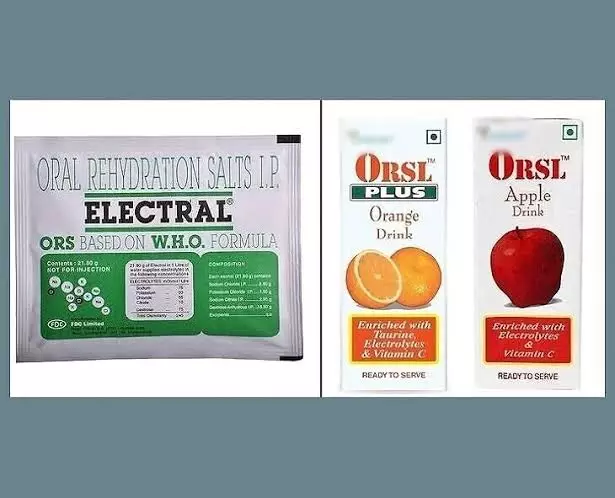
Hyderabad: During the monsoon season, food and water contamination often leads to diarrhoea among children and adults, making ORS (oral rehydration solution) a critical remedy. However, many pharmaceutical shops in the city are misleadingly selling flavoured drinks as ORS.
The World Health Organisation (WHO) and Unicef recommend an ORS formulation with a total osmolarity of 245 mOsm/L. This formula includes specific amounts of sodium chloride (2.6 grams/litre), glucose anhydrous (13.5 grams/litre), potassium chloride (1.5 grams/litre), and trisodium citrate dihydrate (2.9 grams/litre).
The corresponding osmolarity levels per litre of water should be: sodium 75 mmol/litre, chloride 65 mmol/litre, glucose 75 mmol/litre, potassium 20 mmol/litre and citrate 10 mmol/litre.
Despite this, products like ‘ORSL’, ‘ORSL Plus’, ‘ORSL Rehydrate’, ‘Fruitnik Electro+ ORS’, ‘Rebalanz VitORS’ and ‘ORS FIT’ are being sold under the guise of ORS, even though they do not adhere to WHO-recommended formulations and are not intended for treating diarrhoea.
"Some pharmacies falsely claim these products follow WHO guidelines and can restore fluids and electrolytes lost due to dehydration during diarrhoea, which misleads the public and results in financial loss," said Dr Sivaranjani Santosh, a paediatrician.
Deccan Chronicle found these flavoured 'ORSL' and 'ORSL Rehydrate Electrolyte' drinks widely available at pharmacies in Musheerabad and Secunderabad, where they were being marketed as ORS. Many of these drinks mention 'Not an ORS' or 'Do not use in diarrhoea' in a font that is not visible at first glance.
"The importance of ORS is underscored by its role in reducing mortality rates from 20-30 per cent with only intravenous fluid therapy (IV fluids) to just three per cent. The ORS was adopted by WHO in 1978 as the primary treatment for dehydration caused by diarrhoea and is considered one of the most significant medical discoveries of the 20th century, Dr Santosh told Deccan Chronicle.
Many pharmaceutical companies have introduced substitute products that do not meet WHO standards and also violate the law as ORS is classified as a drug under Clause 27 of Schedule K of the Drugs and Cosmetics Rules, 1945, Dr Santosh said.
Consuming these flavoured drinks during diarrhoea can be harmful, as the added sugar increased the osmolarity of the solution, worsening dehydration and diarrhoea, and potentially leading to hospitalisation.
"ORS should not taste sweet; these sweetened versions do more harm by causing osmotic diarrhoea and electrolyte imbalances, including hypernatremia," Dr Santosh explained.
Dr Rathod Pradeep Kumar, a consultant paediatrician, emphasised the need to clearly distinguish between WHO-recommended ORS products and flavoured drinks.
"These drinks are widely available because they are not regulated under price control by the Drug Control Administration, as they fall under the FSSAI (Food Safety and Standards Authority of India), which exempts them from DCA monitoring," he explained.

